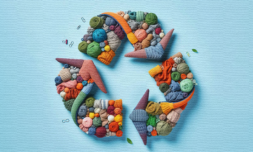The organisation wants you to think twice before tossing that jumper.
As far as environmental catastrophes go, your wardrobe may not be the first culprit that comes to mind. But Gloucestershire Recycles, a coalition of the country’s councils, is here to remind us that our favourite fast-fashion impulse buys are part of the problem.
Their latest campaign, ‘Wear Not Waste’, is encouraging people to start thinking of clothes as renewable resources, tackling overconsumption and rapid trend cycles with greener alternatives.
In the UK alone, around 350,000 tonnes of clothes are thrown away each year rather than recycled, wasting valuable textile resources and worsening the industry’s negative environmental impact.
Mike Evemy, of Cotswold District Council, said ‘Most of us know that fast fashion can be wasteful and damaging to the environment because of the resource-intensive way items are produced, the materials used and the fact many items are of low quality and don’t last.’
‘There is some good news though,’ he continued. ‘Two-thirds of people in the UK say they have bought clothing second-hand and the vintage market is booming, particularly among younger people.’ It’s this trend that the initiative is hoping to cultivate.
‘Wear Not Waste’ has a key offering it hopes to boost these goals; a clothes swap kit, designed to turn community centres, gardens, and living rooms into their very own recycling centres.
Each kit comes complete with rails, hangers, signs, and mirrors. Basically, everything you need to organise an impromptu swap shop, minus the people willing to hand over their once-loved, now-questionable wardrobe items.

The scheme also offers an information pack for teachers to help educate young people on the topic of fast fashion, and is running a competition to win two £50 charity shop gift cards.
The production of clothes accounts for 10% of global carbon emissions — more than international flights and maritime shipping combined. And when your old clothes are tossed out, they don’t just vanish; synthetic fabrics take decades, even centuries, to decompose.
‘Wear Not Waste’ is seeking to tackle the issue as the fashion industry churns out an increasing number of wasteful micro-trends per year. The campaign isn’t asking for grand gestures, either – It’s asking that people take small, meaningful steps: swap a shirt, trade a coat, exchange a pair of jeans. Anything but throw your old clothes away.


















